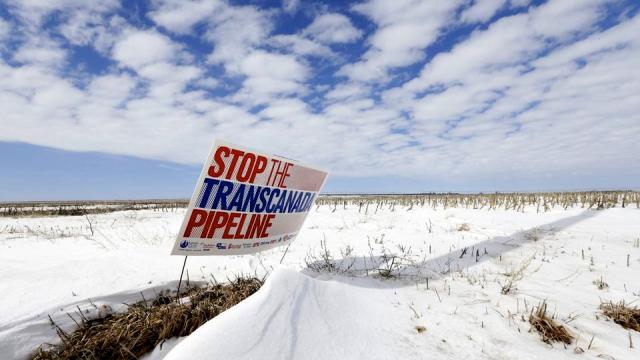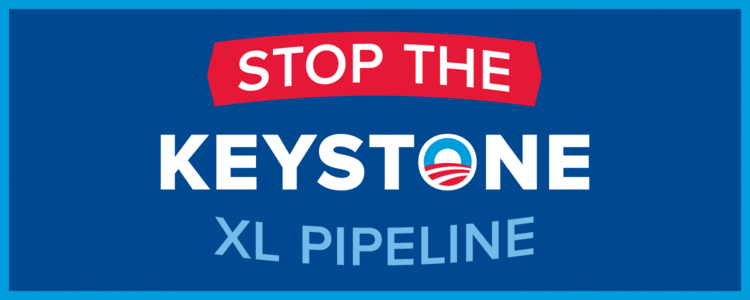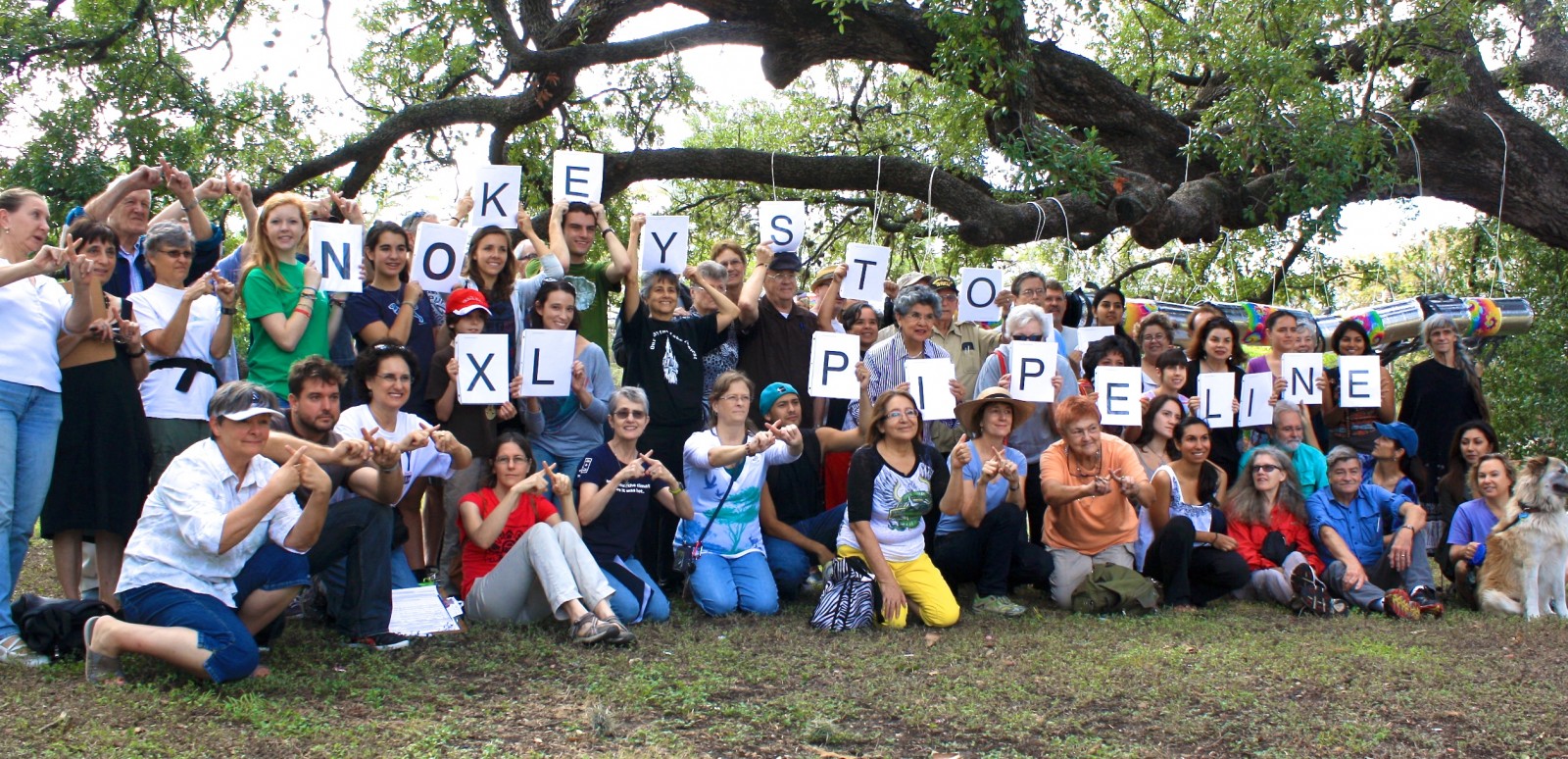
This is an all-hands-on-deck moment to send the message to President Obama that Keystone XL fails his climate test and he must reject it. This evening, we’ll come together around the country to make our voices heard. No KXL protests are being organized by a coalition including CREDO, Rainforest Action Network, Sierra Club, 350.org, The Other 98%, Center for Biological Diversity, Oil Change International, Bold Nebraska, Energy Action Coalition, Natural Resources Defense Council, The Hip Hop Caucus, Overpass Light Brigade, Environmental Action, League of Conservation Voters, Waterkeeper Alliance, Friends of the Earth, Forest Ethics, Forecast the Facts and others.
To join a march, vigil or action in your area, click here
The State Department has released the Final Supplemental Environmental Impact Statement (SEIS) for the proposed northern leg of the controversial and long-embattled TransCanada Keystone XL tar sands pipeline.
In a familiar "Friday trash dump" — a move many expected the Obama administration to shun — John Kerry's State Department chose to"carefully stage-manage the report's release on Super Bowl Friday when most Americans were switching focus to football instead of political scandals.
Anticipating the report’s release, insiders who had been briefed on the review told Bloomberg News the SEIS – not a formal decision by the State Department on the permitting of the pipeline, but rather another step in the department’s information gathering – “will probably disappoint environmental groups and opponents of the Keystone pipeline.”
And, indeed, the new report reads: “Approval or denial of any one crude oil transport project, including the proposed Project, remains unlikely to significantly impact the rate of extraction in the oil sands, or the continued demand for heavy crude oil at refineries in the United States.”
This reiterates one of the earlier draft’s most heavily criticized conclusions that the pipeline is “unlikely to have a substantial impact on the rate of development in the oil sands,” and thus avoids a comprehensive assessment of those climate impacts.
In June 2013, President Obama said in a speech announcing his Climate Action Plan at Georgetown University that he would only approve the permit if it was proven that “this project does not significantly exacerbate the problem of carbon pollution."
The final environmental review is being released on the heels of damning revelations about the close ties between the Canadian pipeline builder, TransCanada and Environmental Resources Management (ERM). ERM was hired by the State Department to conduct the environmental review.
According to documents obtained by the Sierra Club via Freedom of Information Act requests, TransCanada actually recommended ERM to conduct the study, and claimed, falsely, that the two companies had not worked together before.
Friends of the Earth president Erich Pica did not mince words in his reaction to the State Department's new report, telling the National Journal, "The State Department's environmental review of the Keystone XL pipeline is a farce. Since the beginning of the assessment, the oil industry has had a direct pipeline into the agency."
ERM Group: A History Tied to API
Over the past two years, DeSmogBlog has published a number of articles documenting controversial projects – in Peru, the Caspian Sea, Delaware and Alaska – that the ERM Group has approved. In each case the projects have been permitted and have eventually resulted in spills or severe environmental damage.
ERM Group is a dues-paying member of the American Petroleum Institute, which has spent over $22 million lobbying on behalf of Keystone XL.
Timing of the Release
The Final Supplemental Environmental Impact Statement also precedes a heavily anticipated State Department Inspector General’s report addressing these potential conflicts-of-interest between TransCanada, ERM and the State Department, as has been covered here onDeSmogBlog. It also occurred on a Friday afternoon before the Super Bowl, with attention of much of the American public diverted.
Environmental groups and opponents of the Keystone XL pipeline were surprised by the timing and suddenness of the report’s release. The surprise was not shared by supporters of the pipeline.
For days, industry reps have been claiming that the SEIS would be released this week. The loudest voice was that of Jack Gerard, chief executive of the American Petroleum Institute (API), who speaking to Reuters last week said, “It's our expectation it will be released next week," citing sources within the administration.
ERM Group is a dues-paying member of API. Of this clear conflict and the timing of the release, Steve Kretzmann of Oil Change International wrote:
"Jack Gerard was apparently briefed by 'sources within the Administration’ on the timing and content of the report. Before the environmental community. Before Congress. Before anyone else. "If that doesn’t prove once and for all what a corrupt process this has been, I don’t know what will. The oil industry, which has had this process rigged since the word go, are the first to know, because of their cozy and corrupt role in this process."
Green Groups Respond
Jim Murphy of National Wildlife Federation asked this of the decision before the State Department:
"The question going into the State Department’s final environmental impact statement is this: Who will State listen to? Will State reverse course after listening to the Environmental Protection Agency experts who criticized the first draft as 'inadequate' and the second draft as ‘insufficient’ on climate impacts, oil spill risks, and threats to water resources? Will it listen to Goldman Sachs, who called Keystone XL key to expanding tar sands production and all the carbon pollution that goes along with it? "What about Canada's own government or the oil industry, which has repeatedly said Keystone XL is needed to realize tar sands growth plans that Canada projects will cause its own carbon emissions to soar 38% by 2030? Or will State stand by the oil industry consultants it hired to write that first draft currently being investigated for conflicts of interest?"
350.org also immediately issued a statement:
"During the State of the Union, President Obama said he wanted to be able to look into the eyes of his children’s children and say he did everything he could to confront the climate crisis. How exactly does he plan on explaining to his grandchildren how building a 800,000 barrel a day tar sands pipeline like Keystone XL helped solve climate change? "The twisted logic in the State Department’s environmental assessment might provide some political cover in DC, but it will be small comfort for future generations who have the bear the impacts of the climate crisis."
More than 76,000 citizens have pledged an oath of civil disobedience if Keystone XL gets the final green-light from President Obama. Though that decision will probably not be made for months.
Green Groups Take Action
In anticipation of the report’s release, a diverse coalition of 16 environmental organizations sent a petition to Secretary of State John Kerry, insisting that the scope of the environmental review is far too narrow and that an entirely new review is necessary.
Citing the National Environmental Policy Act, or NEPA, the groups threaten legal action if the environmental review doesn’t consider the cumulative impact of related projects, like the Keystone XL and the proposed Alberta Clipper expansion.
The groups write:
"The National Environmental Policy Act (NEPA) requires that an EIS consider the cumulative impacts of the proposed federal agency action. Cumulative impacts are defined as: ’the impact on the environment which results from the incremental impact of the action when added to other past, present, and reasonably foreseeable future actions regardless of what agency (Federal or non-Federal) or person undertakes such other actions...’ "The Keystone XL DSEIS fails to address the cumulative effects of Keystone XL and Alberta Clipper, especially the growth-inducing effects that the combined 1.3 million bpd of additional pipeline capacity would have on the rate of tar sands extraction in Canada."
The groups signing the petition include: Sierra Club, Bold Nebraska, Center for Biological Diversity, For Love of Water, Friends of the Earth, Institute for Agriculture and Trade Policy, Labor Network for Sustainability, Michigan Environmental Council, Minnesota Environmental Partnership, Minnesota Public Interest Research Group, Michigan Land Use Institute, National Wildlife Federation, Natural Resources Defense Council, Oil Change International, Rainforest Action Network and 350.org.
"The State Department will open a 30-day comment period on Feb. 5, and the agencies will have 90 days to weigh in," The Washington Post explained. "After a decision is issued other agencies have 15 days to object, and if one does, the president must decide whether or not to issue the permit."
Originally published by DeSmogBlog
3 WAYS TO SHOW YOUR SUPPORT
- Log in to post comments














